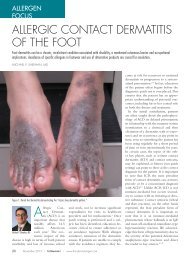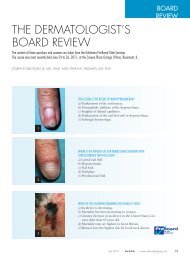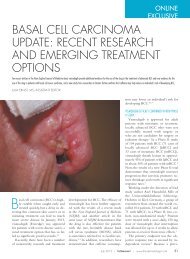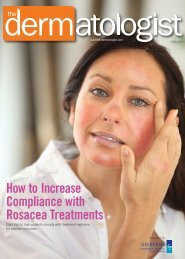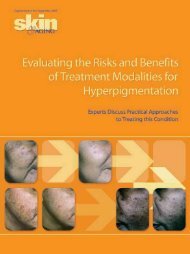Download PDF - The Dermatologist
Download PDF - The Dermatologist
Download PDF - The Dermatologist
You also want an ePaper? Increase the reach of your titles
YUMPU automatically turns print PDFs into web optimized ePapers that Google loves.
FA L L C L I N I C A L D E R M AT O L O G Y C O N F E R E N C E P R O C E E D I N G S<br />
Attendees learning the latest in the field.<br />
WHICH ORAL CONTRACEPTIVE<br />
WORKS IN ACNE?<br />
It is likely that many oral contraceptives have some impact in<br />
acne. <strong>The</strong> dermatologist should choose one or two pills with<br />
which he or she feels comfortable and use those. <strong>The</strong> U.S.<br />
Food and Drug Administration (FDA) approved 3 oral contraceptives<br />
to treat acne: Estrostep, Ortho Tri-Cyclen and YA Z ,<br />
which is the newcomer. YAZ was FDA approved for acne in<br />
2007. A Cochrane meta-analysis evaluated 21 studies using<br />
oral contraceptive pills in the management of acne. <strong>The</strong> number<br />
one conclusion is it is difficult to compare trials because<br />
investigators in acne studies do not always use the same stand<br />
a rd to measure whether or not acne is improving. <strong>The</strong> only<br />
real conclusion the authors could draw was that combination<br />
oral contraceptive pills that contained either cypro t e ro n e<br />
acetate or chlormadinone acetate — both of which are not<br />
available in the United States — were more effective than oral<br />
contraceptive pills that contained levonorgestrel.<br />
One study compared the effect of Yasmin to Diane-35 on<br />
cases of mild to moderate acne. Yasmin has dro s p i renone (3<br />
mg), while Diane-35 has cypro t e rone acetate (2 mg), which<br />
also is antiandrogenic. In the head-to-head comparison, 128<br />
people were included for 9 cycles of treatment. In both<br />
g roups, the lesion counts were reduced by about 60% and the<br />
sex hormone binding globulin increased 3-fold in both groups.<br />
Yasmin also was compared head to head with Ortho Tr i -<br />
Cyclen. <strong>The</strong> study enrolled more than 500 women in each gro u p<br />
for 6 months of treatment. Yasmin was superior in reduction of<br />
total lesion counts and investigator’s assessment, but in re d u c-<br />
tion of inflammatory lesions, the two were fairly equivalent.<br />
<strong>The</strong> newest oral contraceptive approved for the management<br />
of acne is dro s p i renone 3 mg and ethinyl estradiol<br />
20 micrograms (YAZ). In one study, 431 people were<br />
e n rolled and received either YAZ or placebo. <strong>The</strong>re was<br />
about a 50% mean percent change in inflammatory lesions<br />
by the end of the sixth month of treatment. Since this was<br />
m o n o t h e r a p y, 50% reduction is an impressive change.<br />
ORAL CONTRACEPTIVE RISKS<br />
One reason dermatologists may not prescribe oral contraceptives<br />
for their acne patients is the risks associated with<br />
birth control pills. <strong>The</strong>se risks include venous thromboembolism,<br />
stroke, myocardial infarction and breast cancer.<br />
Venous thromboembolism. <strong>The</strong> risk of venous thromboembolism<br />
is tripled in current users of oral contraceptives.<br />
It is increased to 4 to 18 events per 10,000 woman-years.<br />
<strong>The</strong> risk increases with higher doses of ethinyl estradiol. Also,<br />
the mortality rate doubles in women aged 35 to 45.<br />
Stroke. <strong>The</strong>re is a 2.5x increase in ischemic stroke in<br />
women age 20 to 24 who use birth control pills. Again, the<br />
risk is directly proportional to the ethinyl estradiol dose.<br />
Choose pills that have a lower dose of ethinyl estradiol. <strong>The</strong><br />
risk increases with age. It also increases when other risk factors,<br />
such as cigarette smoking, hypertension and migraine<br />
headaches, are present.<br />
Myocardial infarction. Eighty percent of myocardial infarctions<br />
that occur in women who are on birth control pills occur<br />
in women who also smoke cigarettes, with the remainder<br />
occurring in oral contraceptive users with other risk factors,<br />
such as hypertension or diabetes.<br />
Breast cancer. A large World Health Organization metaanalysis<br />
looked at more than 53,000 women with breast cancer<br />
and more than 100,000 controls. <strong>The</strong> relative risk of<br />
breast cancer was 1.24 in current users of birth control pills<br />
S U P P L E M E N T T O S K I N & A G I N G • M A R C H 2 0 0 8 • 1 3



